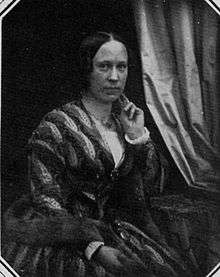Bertha Beckmann

Bertha Beckmann (1815–1901) appears to have been Germany's first professional female photographer. Together with her husband, she opened a studio in Leipzig in 1843 and ran the business herself from his death in 1847.[1]
Biography
Born in Cottbus, Brandenburg, Wehrnert-Beckmann first worked as a hairdresser in Dresden in 1839. There, in 1840, she met her future husband, Eduard Wehnert (1811–1847) a photographer,[2] who introduced her to daguerrotyping and to the recently introduced color-tinting process based on glass-plate negatives which allowed an unlimited number of prints. In 1843, together with her husband, she opened a studio in Leipzig, becoming Germany's first known professional female photographer. After her husband's death in 1847, she continued to run the business herself. In 1849, she went to the United States where she opened studios in New York, first at 62 White Street and later at 385 Broadway. While in America, she received a diploma for special services to portrait photography. She returned to Leipzig in 1851 after transferring her New York business to her brother. In 1866, she moved her place of business to Leipzig's Elsterstraße where she had several employees. Her studio became one of the most notable addresses in the city. She retired in 1883 at the age of 68.[1][3]
Exhibitions
Wehnert-Beckmann was one of two photographers from Saxony to exhibit at the 1854 Erste Allgemeine Deutsche Industrieausstellung (First German Industrial Fair) in Munich where she displayed paper prints in addition to daguerrotypes.[2] Today her work can be seen in Leipzig's Stadtgeschichtliches Museum (City Museum).[1]
Assessment

Her work combines a human approach with high levels of technical and artistic quality.[2] Specializing in portraits, her most impressive works are those of children. Her interest in technical innovations, her use of modern advertising methods and her sense of business all contributed to her outstanding success as a photographer.[1]
References
- 1 2 3 4 Nicole Schönherr, Straßennamen in Dresden – Reine Männersache? Landeshauptstadt Dresden. Der Oberbürgermeister, Gleichstellungsbeauftragte für Frau und Mann, Dresden 2005, page 32. (German) Retrieved 8 March 2013.
- 1 2 3 "Bertha Wehnert-Beckmann (1815 –1901)", Deutsches Historisches Museum. (Danish) Retrieved 8 March 2013.
- ↑ "Bertha Wehnert-Beckmann", Luminous Lint. Retrieved 8 March 2013.
External links
| Wikimedia Commons has media related to Bertha Wehnert-Beckmann. |